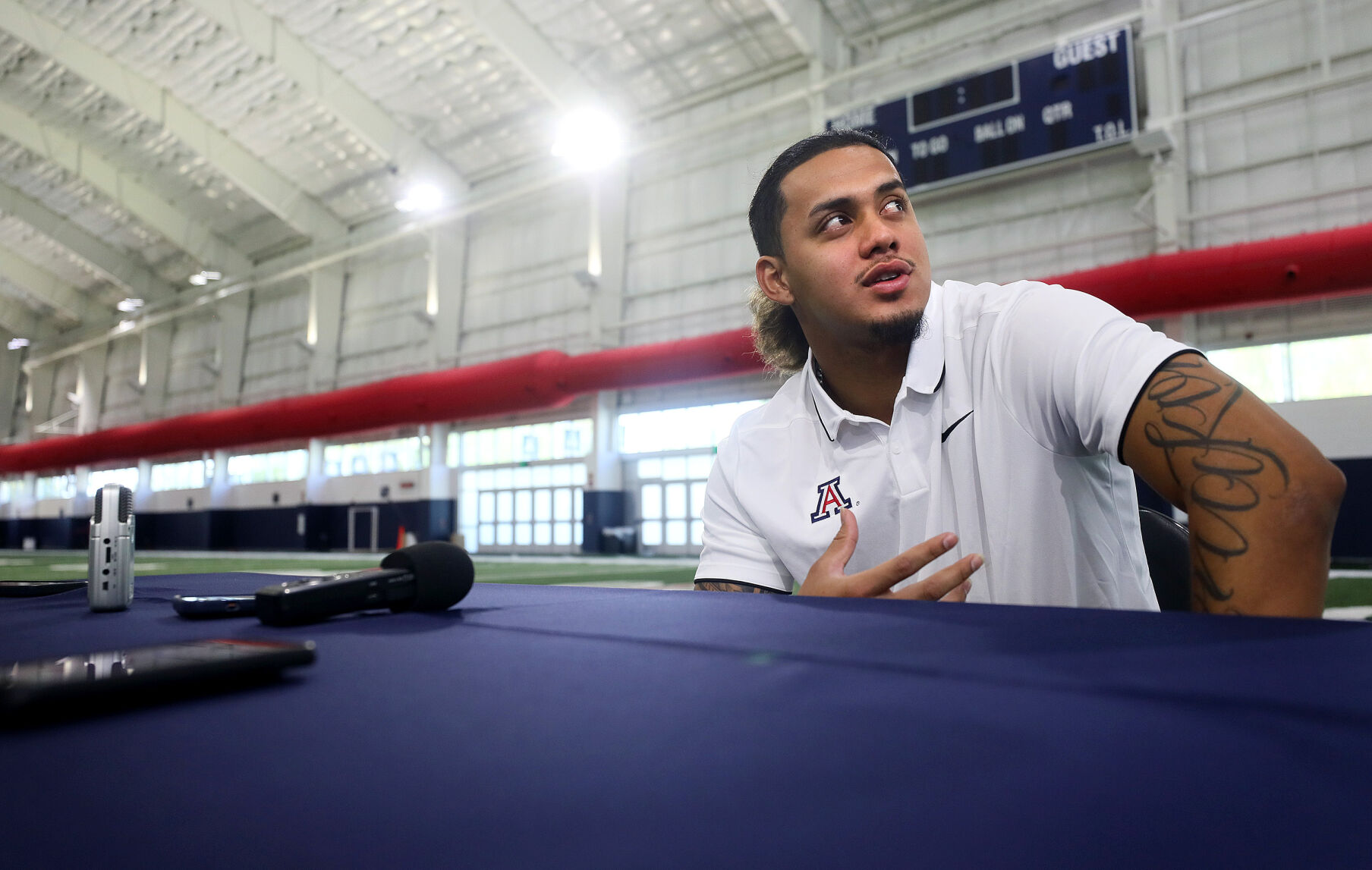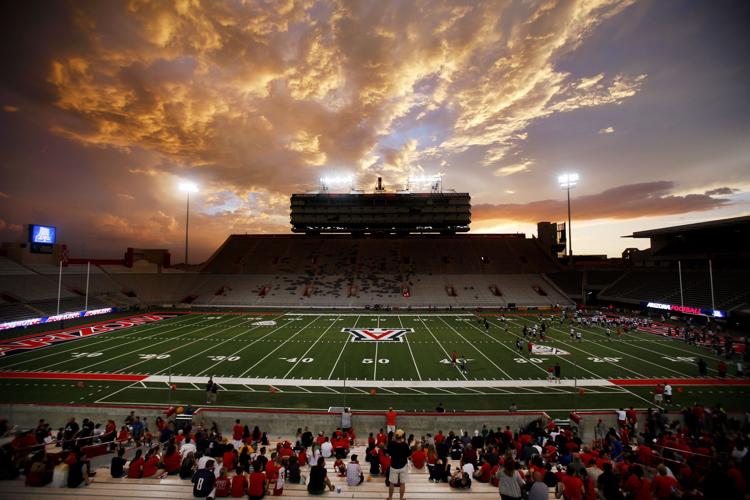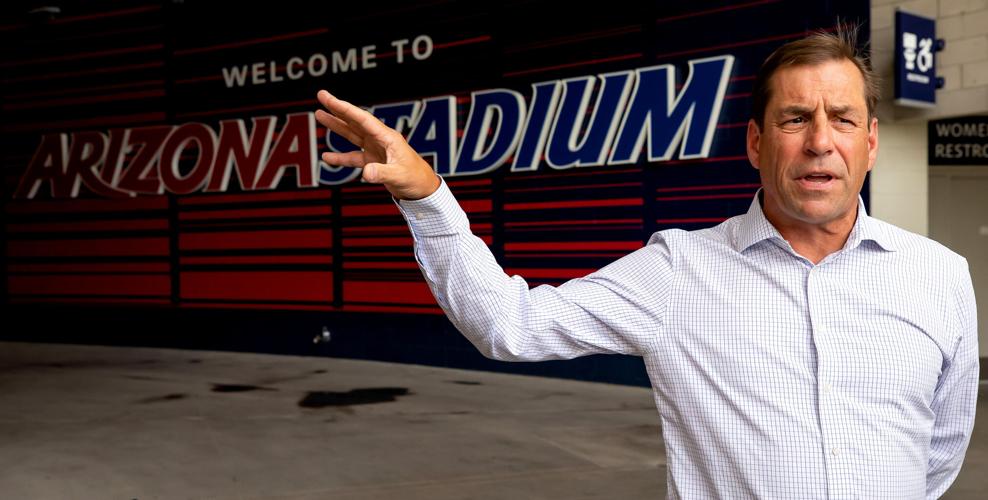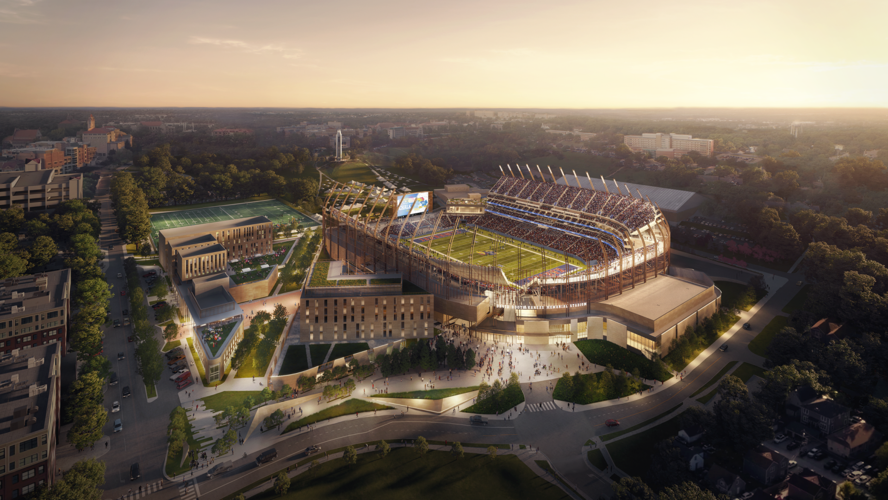Deciding whether to stay in the Pac-12 Conference or pursue opportunities elsewhere took up a lot of oxygen in university meeting rooms from Tucson to Seattle.
It was far from the only item on Arizona athletic director Dave Heeke’s to-do list this year.
Besides having an integral role in the Wildcats’ upcoming move to the Big 12 — the main subject of Part 1 of our-two part Q&A with the leader of the UA athletic department — Heeke has dealt with myriad issues on campus.
Capital-improvement projects are never-ending and always top of mind; the west side of Arizona Stadium remains an expensive, unsolved puzzle. Heeke and his staff also had to figure out the best course of action regarding starting quarterback Jayden de Laura, whose involvement in a sexual assault case when he was a high school student became public in spring.

Athletic director Dave Heeke said last week the UA was "very close prior to COVID" to having a renovation plan in place for Arizona Stadium. "Then COVID came, and that's really thrown us a curveball. But we're looking at it again. It would definitely be a different type of staging and phasing of how we can modernize the west side."
Those two subjects are covered at length in this conversation. The interview has been lightly edited.
There was a time before the pandemic when you were moving forward on the west-side project at Arizona Stadium. What’s the latest?
A: “We were very close prior to COVID. We were very close to being able to really lay a plan out and start to step through it and do it in phases. Then COVID came, and that's really thrown us a curveball. But we're looking at it again. It would definitely be a different type of staging and phasing of how we can modernize the west side.
“These last 3½ years, when you start to talk about all the things that have happened and changed in college athletics, it is very challenging on the financial side. COVID and (inflation), we live right in that lane of those things that have been most impacted by expense increases — food, gas, airplane tickets, hotels. It is what we do. That's the bulk of our operating budget for our sports teams. ...
“Those kinds of expenses really pressure us. We're really looking at some creative ways to hit some smaller pockets of the stadium. But ... it's not going to happen next year.

The University of Arizona has discussed renovating the west side of Arizona Stadium for years; current UA athletic director Dave Heeke believes the school ought to think bigger.
“My vision, I'd really like us to be talking in a bigger way. How do we take this whole end of campus — what I like to call the ‘Athletic District’ — and transform it in a different way, in a wholly different way? A $500 million to $1 billion retail, real estate development project, enhancement of all the facilities, those kinds of things. What could you think (of that’s) much bigger and broader than just, let's knock a grandstand down?
“Those are the kinds of conversations we need to have in college athletics now, as all of these things have changed, (as opposed to) the more traditional, ‘Raise dollars, fund this, once you raise them you can start building.’ We've got to look in a more professionalized, almost business sense, corporate way, of how we do those kinds of things.
“We want a vibrant area. Can you do different things? We need to look at those kinds of creative ways versus just, how do you knock something down and rebuild it and pay for it.”
Elsewhere in the Big 12, Kansas just released renderings for a renovation of its football stadium and the area surrounding it. They talked about it being a “Gateway District.” Something bigger and more long-term. Is that the idea?
A: “Sustainability. How do we build solid decision-making and growth opportunities that help us be sustainable long term? We needed some very significant facility upgrades over the last six years; our facilities have fallen way behind in a number of places in a lot of our sports other than football. We needed to upgrade at Hi Corbett. We needed a new stadium for softball. We needed to upgrade our swimming and diving (facilities). We are upgrading our golf program now with a nearly $15 million project. We have plans to do a new tennis facility.

This rendering depicts the 'Gateway District' project at the University of Kansas, the latest school to upgrade and renovate its football stadium and the area around it.
“Those are really important for those sports and for their viability. (But) those were short-term fixes. Then you really have to look at, OK, how are we going to stay competitive and relevant in the long term? We've got to look at it a little bit differently. ...
“We also need to look at everything that we do (in terms of), what are those revenue opportunities? How can we grow revenues? No decision ... is going to be done, or renovation, unless there are components that drive revenue back to the bottom line. Because we're gonna go into an environment (in the Big 12) that has significant advantages in certain areas, whether that's in budget areas or facility areas, smaller programs (that) have more resources to spread amongst all their programs. So we gotta figure out how we can grow revenue here. That's going to be really important over the next five years, six years, seven years.”
We know you can’t talk about the specifics of the Jayden de Laura situation. But, in general, what is the process when you're bringing in a student-athlete as far as vetting them and checking their background?
A: “Well, there's a full system that we have in place, and it is in place at generally every university. Every university has their own little nuances because each university is unique; we don't have one policy that every university in the country follows.
“But yeah, we vet all of our recruits, whether they're high school (students) or transfers. There's an abundance of paperwork that goes back and forth with the prospective student-athlete, with the previous schools that they have attended. All of those are logged and then monitored through our compliance office. All those questions are asked.
“It has changed (because of the transfer portal). Traditionally, recruiting was high school-driven, multiyear-driven, visiting with principals, counselors, coaches ... parents. You got to learn families.

Arizona quarterback Jayden de Laura speaks to assembled media during the Wildcats' 2023 preseason media day at the Cole and Jeannie Davis Sports Center on Aug. 1.
“Now, it's a compression with the transfer portal. Those things sometimes are happening in weeks, in days. We’ve got to do our due diligence. We (have to) follow those steps. We don't compromise that in any way based on that. That's an emphasis point for us, like everyone around the country. ...
“You are challenged because it's a different recruiting timeline. But it’s very important, because those transfer (players) are being recruited by 10 (schools); you somehow have to get to the point where you can ask, offer and get them signed. But you have to do it the right way. And I'm very confident in our system.”
It's not foolproof, though.
A: “I don't think there's any system that you create out there, whatever it may be, that is foolproof. Everyone needs to be truthful, honest, forthright, answer questions, follow the procedure appropriately. That's no different than any line of business or in anything that we do. The system is only as good as those people who will engage themselves in it.”
If you do find something, what’s the department’s process for assessing that? Is it a decision that’s made collectively? By the coach? You?
A: “It’s the administration. Myself, our administration and the university. Those conversations are taking place with the dean of students, appropriate administrative personnel on campus, myself, our team here, compliance. Yes, coaches are consulted and involved in the conversation, but it isn't a coach-driven process.
“We evaluate those, and then we go back to, what are the policies that are in place at the university for our general students? And yes, there's a higher standard for our student-athletes at times. We'll take that into consideration. And then we make the decision with all the information we have.
“In the case that you guys are referring to it, we looked at every ounce of the information, evaluated it. And that's why that individual stayed and remained a member of our program.”







